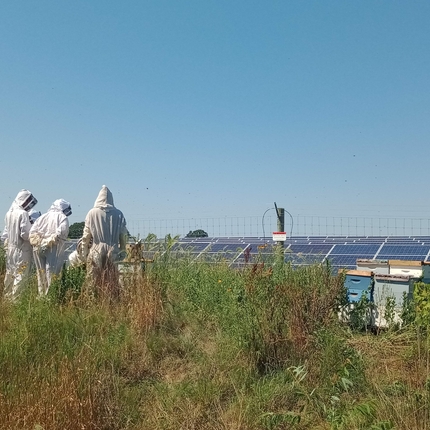By Mark Moran, Public News Service - Iowa
Farmers, ranchers and livestock producers are working with solar companies in Iowa to find multiple uses for land once used only to plant corn and soybeans.
Some are investing in what's known as "dual-use solar" or agrivoltaics. They are cultivating profitable crops, grazing livestock, even raising healthier honeybees, all in the shadows of solar panels. Farmers can grow clover and other highly pollinating grasses under the panels, and put beehives adjacent to those fields.
Lindsay Mouw, policy associate at the Center for Rural Affairs, said "solar beekeeping" is an example of how alternative energy interests and farmers cannot only coexist, but mutually benefit. She argued it will be a necessity as solar consumes more Iowa farmland.
"If we want to keep land in some type of agricultural production, while producing energy with solar, solar beekeeping or other dual-use solar practices are a great option to do that," Lindsay explained.
Lindsay pointed out the practice gives offers solar beekeepers diverse pollen sources for honey, which can then be sold as a specialty, locally grown product. Project developers benefit from the energy produced by the solar panels and nearby farmers profit from the bees' pollination services.
In addition to environmental benefits, local beekeepers see health benefits, too.
Joel Fassbinder, owner and operator of Highlandville Honey Farm in Winneshiek County, was raised in a beekeeping family and is in his ninth year of running his own operation. He said moving his bees away from traditional farms using pesticides has produced healthier bees.
"Being in Iowa, you're around conventional farming a lot, with spraying and stuff, and so, any chance to move them in a place where there might be less of that going on is a benefit," Joel emphasized. "Also, the honey that they make is not only good tasting and light colored for human consumption, but bees consume it as well."
Backers of dual-use solar say it can provide new revenue streams for farmers, as well as avenues into ag production for people who want to farm or raise livestock on a smaller scale.
Click here to listen to the interview.





